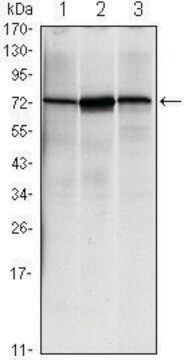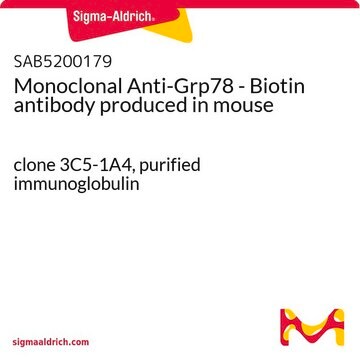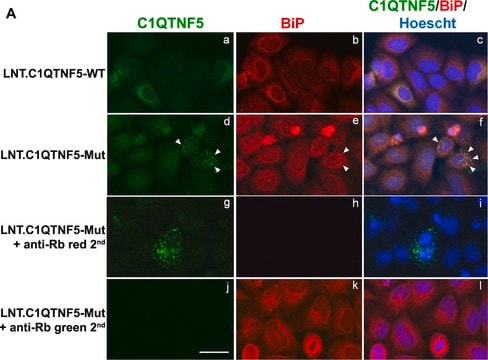MABC675
Anti-HSPA5 Antibody, clone 4E3
ascites fluid, clone 4E3, from mouse
동의어(들):
78 kDa glucose-regulated protein, GRP-78, Endoplasmic reticulum lumenal Ca(2+)-binding protein grp78, Heat shock 70 kDa protein 5, Immunoglobulin heavy chain-binding protein, BiP
로그인조직 및 계약 가격 보기
모든 사진(3)
About This Item
UNSPSC 코드:
12352203
eCl@ss:
32160702
NACRES:
NA.41
추천 제품
생물학적 소스
mouse
Quality Level
항체 형태
ascites fluid
항체 생산 유형
primary antibodies
클론
4E3, monoclonal
종 반응성
human, rat, mouse
기술
immunohistochemistry: suitable
western blot: suitable
동형
IgG1
NCBI 수납 번호
UniProt 수납 번호
배송 상태
wet ice
타겟 번역 후 변형
unmodified
유전자 정보
human ... HSPA5(3309)
일반 설명
The gene HSPA5 encodes a protein named GRP-78 (78 kDa glucose-regulated protein) also known as BiP (immunoglobulin heavy chain-binding protein) or heat shock 70 kDa protein 5. While originally discovered as one of set of genes that were induced upon cellular starvation and stress, HSPA5 encoded GRP-78 is now known to be an important member of the heat-shock family of proteins. The HSPA5 encoded GRP-78 protein appears to play a role in helping in the assembly of multimeric protein complexes in the endoplasmic reticulum (ER). Cellular localization is in the endoplasmic reticulum lumen and appears as cytoplasmic-like staining. The HSPA5 encoded protein is an essential component of the translocation processes within the endoplasmic reticulum and also functions in the retrograde transport across the ER membrane of incorrectly folded proteins destined to be degraded by the ubiquitin proteasome system. The HSPA5 encoded protein, while widely expressed in all cells types under normal conditions, is particularly induced under conditions of cellular stress, heat, or toxins and conditions which lead to the accumulation of unfolded proteins in the ER. EMD-Millipore’s Anti-HSPA5 protein mouse monoclonal antibody, clone 4E3, has been tested by western blot in human HeLa and Jurkat cell lysates as well as mouse NIH3T3 cell lysates. The clone has also been successfully tested in immunohistochemistry in human, paraffin-embedded, thyroid tissues.
면역원
Purified recominant fragment of human HSPA5 expressed in E. coli.
애플리케이션
Anti-HSPA5 Antibody, clone 4E3 is a highly specific mouse monoclonal antibody, that targets GRP-78 & has been tested in western blotting & IHC.
Research Category
Apoptosis & Cancer
Apoptosis & Cancer
Research Sub Category
Apoptosis - Additional
Apoptosis - Additional
Western Blotting Analysis: A 1:500-2,000 dilution of this antibody detected HSPA5 in 10 µg of NIH/3T3, Jurkat, and A431 cell lysates.
Immunohistochemistry Analysis: A 1:1,000 dilution from a representative lot detected HSPA5 in rat cerebellum, rat pons/midbrain, rat hippocampus, and human thyroid tissues.
Optimal working dilutions must be determined by end user.
Immunohistochemistry Analysis: A 1:1,000 dilution from a representative lot detected HSPA5 in rat cerebellum, rat pons/midbrain, rat hippocampus, and human thyroid tissues.
Optimal working dilutions must be determined by end user.
품질
Evaluated by Western Blotting in HeLa cell lysate.
Western Blotting Analysis: A 1:500 dilution of this antibody detected HSPA5 in 10 µg of HeLa cell lysate.
Western Blotting Analysis: A 1:500 dilution of this antibody detected HSPA5 in 10 µg of HeLa cell lysate.
표적 설명
~72 kDa observed. Uncharacterized bands may appear in some lysate(s).
물리적 형태
Mouse monoclonal IgG2b ascitic fluid containing up to 0.1% sodium azide.
Unpurified
저장 및 안정성
Stable for 1 year at -20°C from date of receipt.
Handling Recommendations: Upon receipt and prior to removing the cap, centrifuge the vial and gently mix the solution. Aliquot into microcentrifuge tubes and store at -20°C. Avoid repeated freeze/thaw cycles, which may damage IgG and affect product performance.
Handling Recommendations: Upon receipt and prior to removing the cap, centrifuge the vial and gently mix the solution. Aliquot into microcentrifuge tubes and store at -20°C. Avoid repeated freeze/thaw cycles, which may damage IgG and affect product performance.
분석 메모
Control
HeLa cell lysate
HeLa cell lysate
면책조항
Unless otherwise stated in our catalog or other company documentation accompanying the product(s), our products are intended for research use only and are not to be used for any other purpose, which includes but is not limited to, unauthorized commercial uses, in vitro diagnostic uses, ex vivo or in vivo therapeutic uses or any type of consumption or application to humans or animals.
적합한 제품을 찾을 수 없으신가요?
당사의 제품 선택기 도구.을(를) 시도해 보세요.
Storage Class Code
12 - Non Combustible Liquids
WGK
nwg
Flash Point (°F)
Not applicable
Flash Point (°C)
Not applicable
시험 성적서(COA)
제품의 로트/배치 번호를 입력하여 시험 성적서(COA)을 검색하십시오. 로트 및 배치 번호는 제품 라벨에 있는 ‘로트’ 또는 ‘배치’라는 용어 뒤에서 찾을 수 있습니다.
Bum-Joo Cho et al.
Investigative ophthalmology & visual science, 60(4), 1254-1264 (2019-03-30)
To investigate whether rapamycin protects tear production and the ocular surface during endoplasmic reticulum (ER) stress-induced dry eye syndrome in mice. Tunicamycin was injected intraperitoneally in BALB/c mice without or with rapamycin (TM or RM5 group). Peritoneal injection of PBS
Jonas Sieber et al.
The Journal of biological chemistry, 292(46), 18878-18885 (2017-09-16)
The up-regulation of chaperones such as the 78-kDa glucose-regulated protein (GRP78, also referred to as BiP or HSPA5) is part of the adaptive cellular response to endoplasmic reticulum (ER) stress. GRP78 is widely used as a marker of the unfolded
Serum-reduced media impacts on cell viability and protein expression in human lung epithelial cells.
Mahamud-Ur Rashid et al.
Journal of cellular physiology, 234(6), 7718-7724 (2018-12-06)
Serum starvation is a widely used condition in molecular biology experiments. Opti-MEM is a serum-reduced media used during transfection of genetic molecules into mammalian cells. However, the impact of such media on cell viability and protein synthesis is unknown. A549
자사의 과학자팀은 생명 과학, 재료 과학, 화학 합성, 크로마토그래피, 분석 및 기타 많은 영역을 포함한 모든 과학 분야에 경험이 있습니다..
고객지원팀으로 연락바랍니다.







